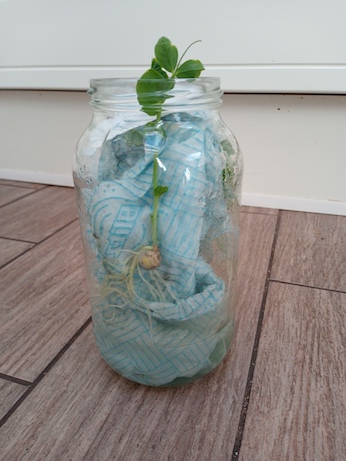
Large seeds like beans and peas contain enough nutrients that they can develop into a small plant without any soil, so long as they are provided with water. This presents a great opportunity for children to watch the way a seed grows and develops close-up.
It is very simple. All you need is a glass jar (a jam jar or coffee jar will do fine) some paper towel or cotton wool and a couple of bean or pea seeds. Then pack the padding material into the jar quite tightly - you don't want your seeds to slip down - insert a couple of seeds down the side of the padding, so they are held half-way up the side of the jar. Pour in enough water to ensure that the whole thing is moist, but the seed is not waterlogged and keep an eye on it to ensure it doesn't dry out. You can then watch the seed do its thing.
It would be good to get your young scientist to draw what happens at various different stages. If they are keeping a Nature Journal then this would be a good place to record developments. What comes first, the roots or the growing shoot? Which parts are green? Notice how the root always heads downward and the shoot upwards, whichever way round the seed is placed in the jar. Provide it with some light (a windowsill is ideal) as soon as the shoot starts to develop leaves. How long does the whole process take, until you have a small plant? See how far your plant will develop before it starts to run out of steam. Of course, if it were growing in the garden, it would take up nutrients from the soil to keep going, but even without that it can get quite a long way, since the chlorophyll in the leaves captures energy from the sun, enabling it to synthesise sugars from CO2 and water.